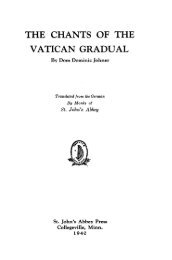William Byrd: A Celebration, edited by Richard Turget - MusicaSacra
William Byrd: A Celebration, edited by Richard Turget - MusicaSacra
William Byrd: A Celebration, edited by Richard Turget - MusicaSacra
You also want an ePaper? Increase the reach of your titles
YUMPU automatically turns print PDFs into web optimized ePapers that Google loves.
“Blame Not the Printer”: <strong>William</strong> <strong>Byrd</strong>’s Publishing Drive, 1588–1591 — 19<br />
embarrassing “association” with the Catholics, nor the whole appropriation of him as an enemy<br />
of the state <strong>by</strong> eager latter-day Catholics, will quite do.<br />
However considerable the temptation to plunge straight into the debate on <strong>Byrd</strong>’s political<br />
and social status, I wish to defer consideration of such larger matters for the moment in order<br />
to consider a material aspect of Spenser’s life and career to which Montrose draws attention,<br />
and which also bears thinking about in relation to <strong>Byrd</strong>. He writes: “We may understand<br />
Spenser’s own publication process, unfolded over the last two decades of the sixteenth century,<br />
to have been as calculated as [Ben] Jonson’s in its appropriation of the resources of the printed<br />
book to shape a distinctive and culturally authoritative authorial persona.” 4 Contrasting Spenser<br />
with courtier-soldier-scholars like Sidney and Raleigh, Montrose demonstrates the need of the<br />
socially subordinate Spenser “to construct and to sustain an authorial persona in a corpus of<br />
generically varied printed poetry books.” 5<br />
Constructing and sustaining an authorial persona is a very different thing in music than in<br />
poetry. <strong>Byrd</strong> could not project himself as a Colin Clout, nor adopt any other direct autobiographical<br />
persona. But there are other ways of asserting authority, and <strong>Byrd</strong> was the first English<br />
musician to realize the power of print as a decisive factor in doing so. The nature of English<br />
history virtually guarantees that no such categorical statement will survive unmodified: the<br />
eccentric and marginal Thomas Whythorne published a single-authored set of songs in 1571,<br />
well before <strong>Byrd</strong> started on his infinitely more ambitious program. With grant of the monopoly<br />
of printed part-music and music-paper in 1575 to <strong>Byrd</strong> and Tallis, however, a new era<br />
dawned. <strong>Byrd</strong>, who must have been the driving force behind the enterprise, saw that nothing<br />
less would do than a prestigious initial publication dedicated to the Queen—partly in gratitude,<br />
partly with a view to establishing himself, his aged teacher, and English music on a new footing,<br />
as the highly patriotic prefatory matter makes clear. The language of highest status, Latin,<br />
was necessary for such a venture, and music of the highest order to match it, displaying plenty<br />
of what <strong>Byrd</strong> would later reveal as his chief artistic criteria, “depth and skill.” Hence both composers<br />
contributed elaborate canons, as well as other ambitious pieces revealing their mastery<br />
of various polyphonic idioms. But a problem arose because much of Tallis’s contribution, especially,<br />
had been written for the Roman Catholic office observed in Henry VIII’s and Mary I’s<br />
reigns; so the book was, perhaps on that account, coyly entitled “Songs which are called sacred<br />
on account of their texts.” A numerical conceit rounded out the symbolic nature of the publication:<br />
seventeen numbers <strong>by</strong> each composer reflected the seventeenth year of Elizabeth’s reign<br />
and suggest that the work was presented to her as dedicatee on Accession Day, the seventeenth<br />
of November.<br />
Much has been made of the commercial failure of the 1575 Cantiones, and the monopolist’s<br />
subsequent petition for more support from the queen in 1577. Yet these “Latin songs,” several<br />
of them later metamorphosed into English anthems, together with a sizeable repertory that<br />
<strong>Byrd</strong> wrote specifically for the Anglican service, helped to establish the composer’s preeminence<br />
in his own time, and to preserve his memory for succeeding generations of English musicians.<br />
4 Montrose, p. 83.<br />
5 Montrose, p. 84.
















